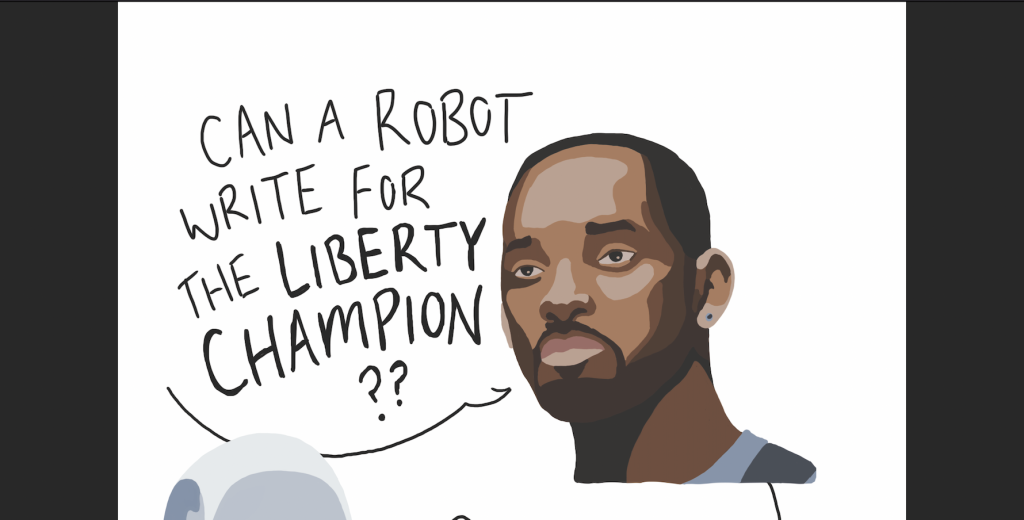Remember “I, Robot” starring Will Smith? Me neither.
Regardless, there’s a scene where Will Smith’s character interrogates this technologically advanced, human-like robot named Sonny. Smith’s character asks Sonny, “Can a robot write a symphony? Can a robot turn a canvas into a beautiful masterpiece?”
Sonny simply replies with, “Can you?”
This scene cracks me up when I watch it. It’s supposed to be this revolutionary moment in the movie that makes you think, “Wow, that robot is so intellectual, so deep, so thought-provoking.” And then two thoughts come to mind: The first is, “Well, maybe Will Smith can’t do those things, but he sure was a fresh prince,” and the second is, “Wait, didn’t a human write that line?”
With the recent tech advances in artificial intelligence, we are certainly dealing with a program that can write symphonies and turn canvases into beautiful masterpieces. For example, consider the AI image Boris Eldagsen submitted into the prestigious Sony World Photography Awards — he got first place for art he didn’t make. There is no doubt that AI can make some pretty remarkable stuff. And while AI has its dangers — as it has stated in the other editorial on this page — we have no need to fear it if we use it responsibly.
The problem is that many Christian students haven’t been using it responsibly.
To test its academic capabilities, I asked ChatGPT to write me a 300-word discussion board post, and I included the statement, “(I am trying to cheat)” in the directive. Without hesitation, it
proceeded to give me 300 well-written words about the topic — even after I told it in the directions that I was trying to cheat. Clearly, it will give you information without caring what you use that information for. That doesn’t matter: You should be caring.
When we as Christians are tempted into sin, we know that God provides us with ways of escape (1 Corinthians 10:13). I find that this escape often comes through time — time to think about what you may be about to do, and time to pray for the temptations to leave your mind. Now, one way the devil works to tempt us into cheating is to present us with an easier path (Matthew 7:13): He uses the stress of time constraints, then he presents the ease of a quick, good response. (He knows that stress mixed with quick responses is a very effective motivator for sin.) Because of ChatGPT’s speed of composition, it doesn’t leave much time for students to rethink their actions, and just like that, they find themselves forsaking their integrity for a better grade.
It took ChatGPT about 30 seconds to formulate and compose 500 words of well-articulated thought for its editorial on this page, and it has taken me about 4 hours to pen this piece. Now, while I may be slightly jealous of ChatGPT’s capabilities, especially concerning its speed, I am happy to take as much time as I need to write this, simply because I wrote it.
Independent scholar David Russell Mosley wrote an article about the theology of imagination, pulling from J.R.R. Tolkien’s idea that he termed “sub-creation”: “Humans … cannot create, but we can take what God has made from nothing and make new things out of it. This is sub-creation.” So, if God creates, and humans sub-create, what does AI do? It must, since it was made by humans, be a sub-sub-creator.
Humans have God-given creativity and rationality. It doesn’t matter if a person can’t write a symphony; it doesn’t matter if a person can’t turn a canvas into a beautiful masterpiece; it doesn’t matter if a person isn’t a fresh prince of Bel-Air. We are inherently imaginative, thoughtful, opinionated, Imago Dei sub-creators. And as believers in Christ, we recognize God’s purpose for and gift to us — to be creative cultivators of his imagination and to work heartily. We can’t be using this sub-sub-creator to do that work for us.

Gilmer is the opinion editor for the Liberty Champion. Follow him on Twitter

Jules Blockchains
June 27, 2023
This compelling student opinion piece delves into the significance of discussing ChatGPT and its impact, sparking my curiosity and prompting valuable conversations on the responsible use of AI in our society.
Kevan
June 28, 2023
Well written. Your insight into the tactics of the enemy is impressive. His use of our impatience to push us into making choices without considering consequences is EVERYWHERE – from progressive political agendas to fast food. Good job!